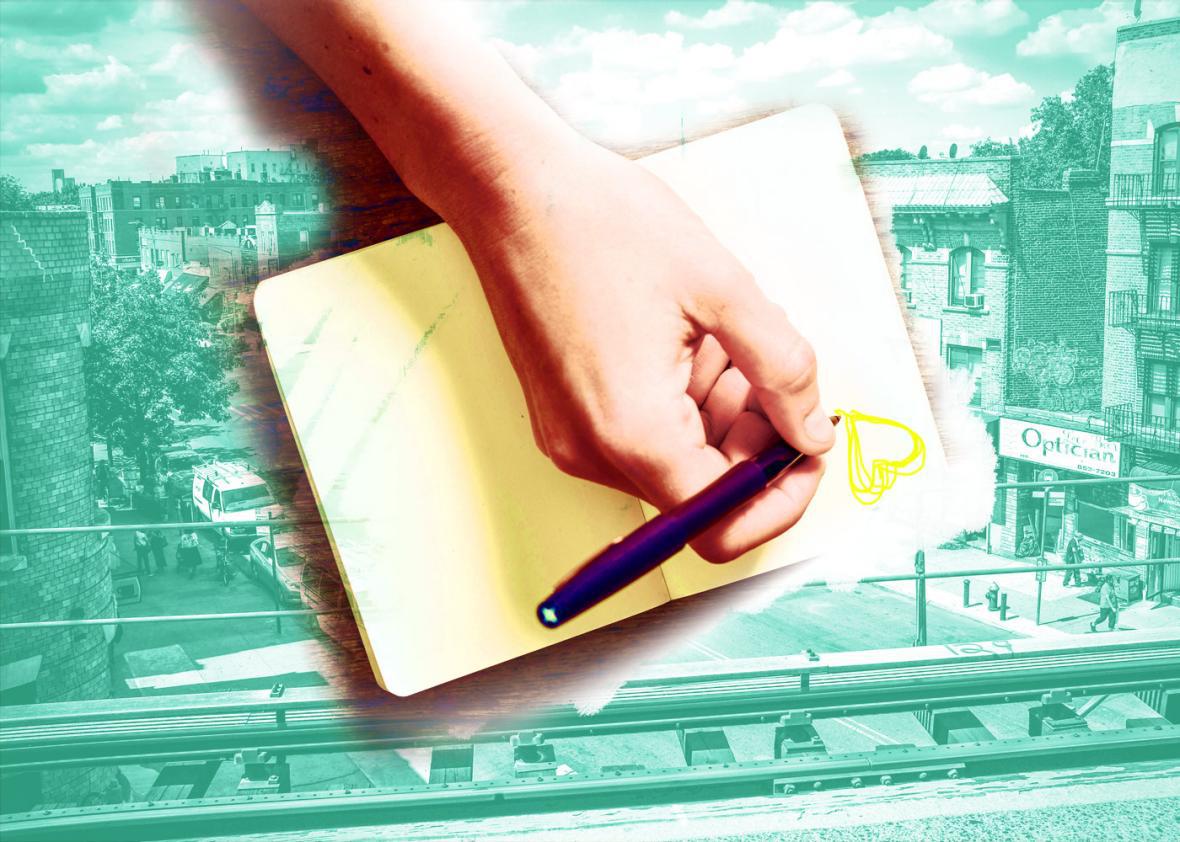“He didn’t want to feel old,” Emma Straub writes of one of the fortysomething protagonists of her wonderful new novel, Modern Lovers. It is such a simple, plaintive statement, and one so revealing about the human condition in general, even though Straub is talking about a specific rudderless, disaffected Brooklynite—a would-be carpenter who once played in a punk band with his now-wife, a real estate agent, and down-the-street neighbor, the proprietor of a hip locavore restaurant called Hyacinth. Andrew, Elizabeth, and Zoe met in college, where they formed Kitty’s Mustache with another classmate, Lydia, who became an indie music idol after embarking on a solo career and overdosing at 27. Scornful, ambitious Lydia was the least talented of the group, and yet she had the foresight to buy the rights to the band’s best song, a feminist anthem named for a line from Sense and Sensibility and famous for its rousing, self-defeating, and self-affirming chorus: I will be calm calm calm calm.
Here is Elizabeth composing “Mistress of Myself,” back at Oberlin, her whole life streaming ahead of her like a mysterious wind: “She wrote the lyrics in her notebook in her small, orderly handwriting, the letters getting messier as she wrote faster and faster.” It is just one of Straub’s many beautiful evocations of breathless momentum, otherwise known as unstoppable time, and neither the messiness nor the acceleration seems accidental: Life, in Modern Lovers, goes too quickly, and never as planned.
When the novel opens, Elizabeth is walking the half block to her best friend Zoe’s house. Zoe, effortlessly wild and glamorous, is married to the solid and unprepossessing Jane, a chef who resents Elizabeth for her close, not-entirely-platonic connection to Zoe; the pair also have a sardonic and charming asshole of a teenage daughter, Ruby. Andrew and Elizabeth have become parents too—their sweet, straight-laced son, Harry, falls for Ruby while she is still on and off with a skateboarding ne’er-do-well called (hilariously, given the book’s temporal preoccupations, and the nonfuture he represents) Dust. The questions animating the book are pointed but universal: Can we stop the past from soaking into the present, and should we want to? What does growing up mean, anyway, and how is it done?

Jennifer Bastian
As in the best ensemble novels, much of the pleasure of Modern Lovers comes from observing its affecting, palpable characters interact. Straub has so intricately and cleverly connected them that when she moves one, the whole chessboard reconfigures. Like a nosy neighbor, I could watch Ruby and Harry, Jane and Zoe, Zoe and Elizabeth, Elizabeth and Andrew fall in and out of love for hours, face pressed to the glass of Straub’s wry, clear prose: Andrew and Harry are both “soft on the inside, like underbaked cookies.” A surgeon who is rarely at home reminds his family of “a ghost who left expensive things lying around the house in an attempt to get you to solve his murder.”
There is much to praise, too, in Straub’s renderings of twee Brooklyn, particularly a cultish meditation-and-kombucha commune that springs up, replete with lissome half-naked yogists and a toothy guru, to seduce Andrew. And Straub is shrewd about high school social dynamics: Harry “didn’t vape or drink malt liquor, because there were other kids who did that and he wasn’t one of them.” She’s funny, especially in a gag involving a highly competent couples therapist who speaks in promiscuous metaphors. Straub can be suddenly, unbearably tender: After Andrew and his son fight, Harry remembers believing “that his father didn’t sleep but instead just sat in a corner of a room, waiting to be played with, like the biggest toy in the house.”
What’s more, Straub has a peculiar and gentle way of producing meaning, allowing characters’ trains of thought to run freely until they end up exposing a truth at once personally significant and broadly aphoristic. The deepening feels so natural you hardly notice it happening, and then you wonder how you arrived at such an inward-facing, luminous place. At one point, Elizabeth (who loves Zoe, a little bit) starts to describe to Zoe how happy her son looked when he mentioned he’d been spending time with Ruby, Zoe’s daughter. But she stops. “Ruby, like Zoe,” Straub writes, “had a long life of adoration ahead of her, and Elizabeth didn’t feel she needed to fuel the fire.” The next few sentences track Elizabeth’s evolving mental argument:
No matter how old you got, there were certain things that clung from childhood—a cool-girl meanness or a nerdy girl’s pining for someone who wouldn’t want her back. Elizabeth saw so much of herself in Harry, even in his silent crushes, the secrets he thought he kept. It was hard to be a boy, just like it was hard to be a girl.
The passage moves from Ruby and her mother, both aloof (their shared cool girl–ness is the reason Elizabeth begins reflecting about childhood qualities that persist through time) to Elizabeth and Harry, both quiet and wistful. Elizabeth observes a pattern repeating in her friend’s family before turning the lens on herself and her son, at the same time intuiting something about the way the two families relate to each other. She sees the multiple doublings, how whatever happens to the parent seems destined to recur for the child. She appears to feel guilt for what she’s bequeathed Harry, even as she senses that to care for a kid often means to care for who you once were (especially if, like Elizabeth and Andrew, you are stuck in a twilit pseudo-youth). Yet she also appreciates the variations wrought by generations: It’s hard to be a boy, but maybe in a different way than it is hard to be a girl. All of this unfurls so organically, with a fluent dreaminess, in sentences that whisper with suggestion rather than stomp around.
Describing her characters’ Brooklyn neighborhood, Straub wisely writes:
She’s heard once that what made you a real New Yorker was when you could remember back three layers—the place on the corner that had been a bakery and then a barbershop before it was a cell-phone store … The city was a palimpsest, a Mod Podged pileup of old signage and other people’s failures. Newcomers saw only what was in front of them, but people who had been there long enough were always looking at two or three other places simultaneously.
This is a lovely insight about New York City made sharper by its salience to the story: Like places, people contain layers, their older selves laminating their younger selves and their kids’ experiences overwriting their own. Andrew may not wish to “feel old,” but perhaps he can settle for feeling both boyish and middle-aged at once, a composite of the people he has been, is, and will be. If none of Straub’s characters act especially calm calm calm calm when confronting time’s passage, at least they grow in awareness about the fluid and unpredictable run of their interconnected lives, edging ever closer to becoming the misters and mistresses of themselves.
—
Modern Lovers by Emma Straub. Riverhead.
See all the pieces in the Slate Book Review.
